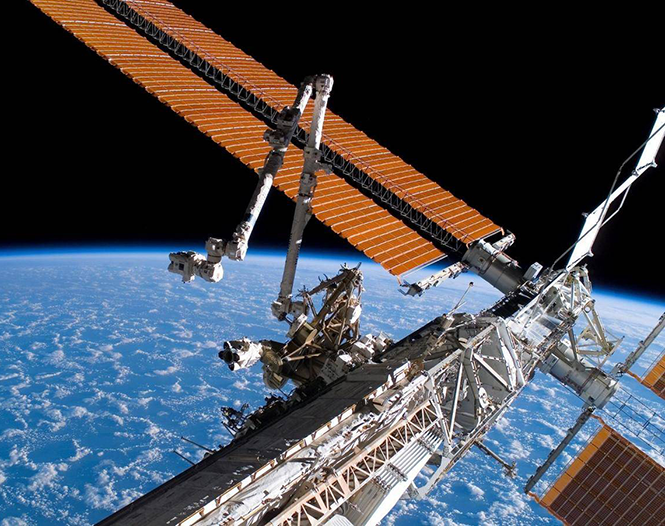Life Beyond Earth
With a universe as big as ours, life beyond earth has to be possible right?
The ISS space station where alien bacteria was recently discovered.
April 15, 2018
The universe is a gigantic place, that’s one thing we know for sure. With billions of galaxies in the universe and even more billions of stars and planets within them, there’s a high chance that life beyond our own planet exists. With new technology being created, there are easier and faster ways to find these mysterious planets and their possibility of inhabiting life.
With our huge universe, it’s impossible to believe that humans may be the only life forms to exist anywhere. Even with all the factors needed for this to be possible, the universe is expanding every day with new stars and planets being created every second. It’s something I’m sure is out there, although finding it might take time.
There are certain studies to prove whether this is possible or not. NASA has been searching through the galaxy for planets that are similar to our own; NASA has stated in Mike Walls’ article from space.com that astronomers think it is very likely that every single star in our Milky Way galaxy has at least one planet that holds life like earth. So far with the help of Kepler – which was launched in 2009 – astronomers have found over 5,000 exoplanets (planets that orbit a star outside the solar system).
A list by Elizabeth Howell from space.com shows the Top 10 planets we know of that are most likely to host alien life are Kepler-186f, Gliese 581g, Gliese 667Cc, Kepler-22b, HD 40307g, HD 85512b, Tau Ceti e, Gliese 163c, Gliese 581d, and Tau Ceti f. Each of these planets having similar characteristics to our own planet. The planet has to have liquid water, the key ingredient to life as we know it, and also has to be found in what’s called the habitable zone (not too close to star/sun, but not too far either).
However, despite this evidence, many believe it is simply impossible for life to be anywhere besides our own planet. Many argue that because the conditions needed for a life to harbor life is too great and improbable. Religion is also something that continually comes up with this argument with claims that “the God of Christianity, Judaism and Islam” created our planet to be the only one to harbor life and no other. As someone who is somewhat religious, I find it hard to believe that we would be the only ones out there. However, there has to be something controlling the ropes as seen by the Fibonacci sequence which works with this idea. With the recent discovery of the space bacteria found on the space station, and the evidence found that Mars may have once inhabited life, aliens are not too far off.

The fact is that there are more people who believe in alien life than people who don’t, which is proven in a poll made by YouGov that claimed Germans are most likely to believe in alien life, at 56 percent, followed by Americans and British, at 54 and 52 percent.
Not only that, but NASA has found evidence that Mars could have once inhabited life on its planet and are still discovering more about it. Even though the Kepler has been found carrying live bacteria that could survive in outer space for a large amount of time, scientists from NASA have confirmed that the bacteria had not come from Earth and was not present on Kepler at the time of its launch, making this bacteria an alien life-form from a possibly different planet.
Eventually, we will find another planet out there that is like our own, maybe even with an advanced civilization. We may even find other life-forms other than our own, as well as the ones we know. It may not happen in our lifetime or we may not even be the ones to find them, but we know for sure that it is probable.



























